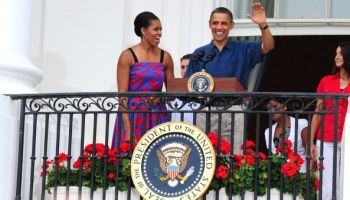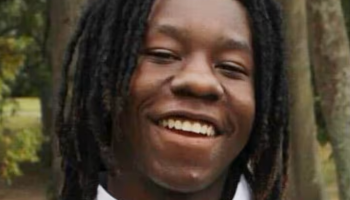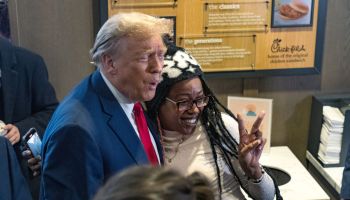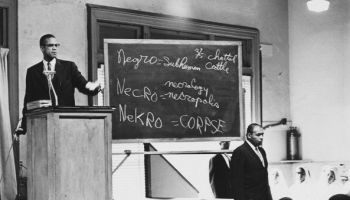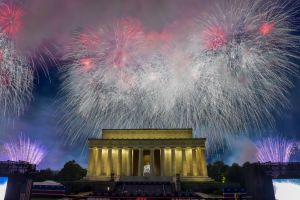
Source: The Washington Post / Getty
As a holiday, Independence Day, like many aspects of America’s folklore, represents an expression of ideas that have yet to come to pass. Posting a rendition of Frederick Douglass’ speech “What, to the Slave, is the Fourth of July’” has become as much an Independence Day tradition for Black people as the family cookout. The words of another great elder ring true on this day.
Ida B. Wells-Barnett once wrote that extending the right to vote, without limitation, to Black people was critical to ending lynching and the dehumanization of Black life. Wells-Barnett understood that the act of voting alone would not make lynchings disappear, but without the right Black people could continue to be treated as subhuman and undeserving of process.
It’s been 245 years since the founders declared independence for themselves, and the fight for freedom and liberation from tyranny continues.
The clearest example is the systematic attack on voting rights and interference in the electoral process at all levels of government. Even as Independence Day was being recognized as a national holiday in 1870, there was a national fight to ratify the 15th Amendment, granting Black men the right to vote.
Wells-Barnett further pointed to the collective political power of Black people, organizing to further their communal interest through the electoral process, as another component of protecting Black life. That fear of organized Black political power, particularly in coalition with other people of color, is evident in the refusal to permit even a discussion on the Senate floor of the For the People Act.
Eight years after the Shelby v. Holder case widely seen as gutting the Voting Rights Act of 1965, the recent Supreme Court decision upholding restrictive Arizona laws further limits the applicability of the remaining provisions of the Voting Rights Act in protecting voting from excessive state intrusions. Written by Justice Samuel Alito, the decision goes beyond simply affirming the Arizona law but reinterprets Section 2 of the Voting Rights Act in a way that could be interpreted as an invitation to conservative controlled states to restrict access to the ballot further.
By arguing that disparate impact doesn’t mean a system is inherently unequal, Alito disregards the clear intentions of laws enacted post, Shelby. Professor Scott Lemieux recently wrote Brnovich v. Democratic National Committee’s outcome, making Shelby feel like a “bait and switch.” Lemieux explained that Chief Justice Roberts pointed to Section 2 as a remaining course of action for those challenging restrictive state laws. But the Alito decision undermines the use of Section 2, particularly as Republican legislatures leverage a lie instigated by the former president to deny access to the ballot.
Despite conservative disdain for so-called “activist judges,” the Alito decision clearly operates to give conservative interests an advantage. The decision also makes it even more necessary for Congressional action.
Shortly before the latest Supreme Court attack on voting rights, the Brennan Center issued a working report calling The For the People Act “a critical step toward achieving an inclusive democracy, long-promised, but not yet delivered.” The article further argued that one of the major issues standing in the way of an inclusive democracy were rules that maintained the old structure of political power.
“Right now, entrenched interests struggling against changing demography are making their final, grasping efforts to maintain an exclusionary system. Unfortunately, our laws and institutions are not currently sufficient to prevent this anti-democratic wave and to guarantee a fair and truly representative democracy,” read the report.
Rules like the filibuster and fake adherence to notions of decorum keep the nation locked in a state of limitation. Lawmakers spend more time protecting their power and influence instead of making decisions in the best interests of all who reside within this country’s borders.
While the founders and their countrymen fought against taxation without representation, today’s people are taxed and often not properly represented. Current elected officials focus on restricting foundational rights for the many instead of passing laws such as Medicaid expansion and properly funding public education systems.
Beyond that, Black people in this country continue to fight against a system intent on compromising for the sake of maintaining a white supremacy status quo. Having elected officials praise the virtues of America and claim freedom and liberty as the country’s foundation while working to subvert the rights of others is not new.
Thomas Jefferson, the main author of the Declaration of Independence, wrote about the equality of all men endowed with inalienable rights like life, liberty, and the pursuit of happiness “ while submitting hundreds of people to a life of bondage. Fighting for freedom and independence didn’t end with the proclamation put forth in 1776.
The fight for full access to the promise of life, liberty, and the pursuit of happiness continues. Voting rights advocates and democracy reformers continue a fight hundreds of years in the making.
SEE ALSO:
Voting Rights Tour Raises Awareness Across The South On Its Way To D.C.
Black Voters Matter Kicks Off Freedom Ride For Voting Rights On Juneteenth

